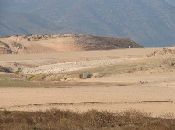| MEDCHANGE |
Effects of land-use and land management practice changes on land degradation under forest and grazing ecosystems. |
| Time span: |
1997 - 2001 |
| Aim: |
The two main aims of this project are (1) to investigate what the effect is of changes (increasing forest and grazing activities) on land degradation; and (2) to assess what the current and likely future changes are in land-use and land management practices. |
| Description: |
The objectives of the project include:
- To investigate the impacts of land-use and land management practice changes in areas of the Western Mediterranean that are vulnerable to land degradation and desertification on water depletion, soil degradation and vegetation health;
- To assess trends in land-use and land management policies and the perception and response of socio-economic agents, occurring as a result of soil-water conservation policies: a holistic research approach combining both natural environmental and societal and socio-economic dimensions will be adopted in order to improve the basis of policies in support of sustainable development;
- To produce models, both conceptual and semi-quantitative, to describe the relationship between hydrology, vegetation, land use and socio-economic constraints and to build scenarios for alternative land-uses/land management practices, under different socio-economic conditions, in order to obtain a tool for regional planning;
- To establish thresholds through the definition of criteria for evaluation and mitigating land degradation;
- To establish the best practices for land management in order to achieve greater sustainability;
- To reinforce information transfer and result dissemination. |
| Countries: |
Field sites and partners in Spain, Portugal, Morocco and Tunisia. |
| Website: |
http://www2.dao.ua.pt/RECNATUR/medchange/index.htm%20 (link expired) |
|



